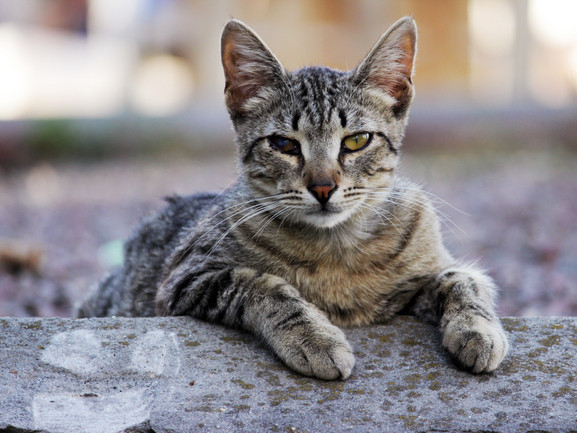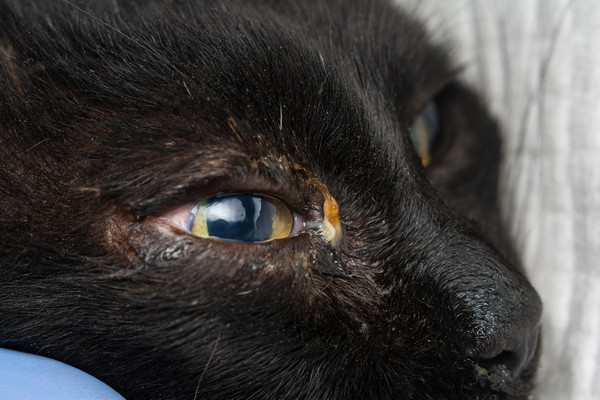Can Cats Get Cold Sores From Humans? No, cats cannot contract cold sores from humans. Feline herpesvirus is species-specific, meaning it only affects cats, while human herpes simplex virus types 1 and 2 (HSV-1 and HSV-2) only affect humans. If you want to protect your feline companion from feline herpesvirus, explore comprehensive information about feline herpesvirus on solcat.net, including symptoms, treatment, and prevention. This will help ensure your cat’s long-term well-being. Learn more about contagious diseases and feline health today.
1. Understanding Feline Herpesvirus
Feline herpesvirus (FHV-1), also known as feline viral rhinotracheitis (FVR), is a highly contagious virus that causes upper respiratory infections and ocular disease in cats. FHV-1 is a common cause of “cat flu.” It’s important for cat owners to understand the causes, symptoms, and prevention methods to protect their feline friends.
1.1. What is Feline Herpesvirus?
Feline herpesvirus (FHV-1) is a virus that primarily affects the upper respiratory system and eyes of cats. It is a common cause of feline respiratory disease complex (FRDC), often referred to as “cat flu.” FHV-1 can cause a range of symptoms, from mild sneezing and runny eyes to more severe conditions like pneumonia and corneal ulcers.
1.2. How Common is Feline Herpesvirus in Cats?
Feline herpesvirus is very common in cats, especially in environments where many cats live together, such as shelters and catteries. According to research from the Cornell Feline Health Center, approximately 97% of cats will be exposed to FHV-1 during their lifetime. While many cats recover from the initial infection, a significant percentage (around 80%) become carriers of the virus. These carrier cats may not show symptoms but can shed the virus intermittently, potentially infecting other cats.
1.3. Feline Herpesvirus vs. Human Herpes Simplex Virus
It’s crucial to understand that feline herpesvirus (FHV-1) is distinct from human herpes simplex virus (HSV-1 and HSV-2). FHV-1 only affects cats and cannot be transmitted to humans. Conversely, human herpes viruses cannot infect cats. Each species has its own specific type of herpesvirus.
2. How Feline Herpesvirus Spreads
Understanding the transmission methods of FHV-1 is essential for preventing its spread among cats. The virus is primarily spread through direct and indirect contact with infected cats or contaminated objects.
2.1. Direct Transmission
Direct transmission occurs when a cat comes into physical contact with an infected cat. This can happen through:
- Close Contact: Sharing food and water bowls, litter trays, or grooming tools.
- Mutual Grooming: Cats grooming each other can spread the virus through saliva and nasal secretions.
- Sneezing and Coughing: Respiratory droplets containing the virus can travel short distances and infect nearby cats.
2.2. Indirect Transmission
Indirect transmission involves a cat coming into contact with contaminated objects or surfaces. This includes:
- Contaminated Objects: Bedding, toys, food bowls, and litter boxes can harbor the virus.
- Human Transmission: The virus can survive on human hands and clothing, allowing humans to unknowingly spread the virus between cats.
2.3. Factors Increasing the Risk of Transmission
Several factors can increase the risk of FHV-1 transmission:
- Overcrowding: Shelters, catteries, and multi-cat households can facilitate the spread of the virus due to close proximity and shared resources.
- Stress: Stressful environments can weaken a cat’s immune system, making them more susceptible to infection and viral shedding.
- Poor Hygiene: Inadequate cleaning and disinfection of shared resources can increase the risk of transmission.
- Lack of Vaccination: Unvaccinated cats are more vulnerable to contracting FHV-1 and developing severe symptoms.
3. Symptoms of Feline Herpesvirus
The symptoms of FHV-1 can vary in severity, depending on the cat’s age, immune status, and overall health. Recognizing these symptoms early is crucial for prompt treatment and management.
3.1. Common Symptoms
The most common symptoms of FHV-1 include:
- Sneezing: Frequent sneezing is often one of the first signs of infection.
- Nasal Congestion: A blocked or runny nose can make breathing difficult.
- Conjunctivitis: Inflammation of the conjunctiva (the pink tissue around the eye) causes redness, swelling, and discharge.
- Ocular Discharge: Runny eyes with clear or purulent discharge.
- Corneal Ulcers: Open sores on the cornea (the clear front part of the eye) can cause pain and vision problems.
- Loss of Appetite: Cats may lose interest in food due to nasal congestion and a decreased sense of smell.
- Lethargy: A general lack of energy and increased sleeping.
- Fever: Elevated body temperature.
- Salivation: Excessive drooling.
3.2. Symptoms in Kittens
Kittens are more susceptible to severe FHV-1 infections due to their immature immune systems. Symptoms in kittens can include:
- Severe Upper Respiratory Infection: Kittens may develop severe nasal congestion and difficulty breathing.
- Pneumonia: Inflammation of the lungs can be life-threatening.
- Failure to Thrive: Infected kittens may not gain weight properly and may appear weak and underdeveloped.
3.3. Chronic Symptoms
Some cats may develop chronic symptoms that persist or recur over time. These can include:
- Chronic Rhinitis: Persistent inflammation of the nasal passages, leading to chronic sneezing and nasal discharge.
- Chronic Conjunctivitis: Recurrent episodes of eye inflammation.
- Corneal Sequestrum: A dark, dead area on the cornea.
 Cat with feline herpesvirus symptoms, showing conjunctivitis
Cat with feline herpesvirus symptoms, showing conjunctivitis
Alt text: A cat displaying symptoms of feline herpesvirus, specifically conjunctivitis, indicated by the pink and sore eyes.
4. Diagnosing Feline Herpesvirus
Diagnosing FHV-1 typically involves a combination of clinical signs, physical examination, and diagnostic testing. Your veterinarian will assess your cat’s symptoms and medical history to determine the likelihood of FHV-1 infection.
4.1. Clinical Signs and Physical Examination
Your vet will look for common symptoms such as sneezing, nasal discharge, conjunctivitis, and corneal ulcers. A thorough physical examination can help rule out other potential causes of these symptoms.
4.2. Diagnostic Tests
To confirm a diagnosis of FHV-1, your veterinarian may recommend one or more diagnostic tests:
- PCR (Polymerase Chain Reaction) Testing: This test detects the presence of FHV-1 DNA in samples collected from the nose, throat, or eyes. PCR testing is highly sensitive and specific, making it a reliable method for confirming FHV-1 infection.
- Virus Isolation: This involves growing the virus in a laboratory from a sample collected from the affected cat. Virus isolation can take several days to complete and is less commonly used than PCR testing.
- Antibody Testing: This test measures the levels of antibodies against FHV-1 in the cat’s blood. Antibody testing can indicate previous exposure to the virus but cannot differentiate between active infection and past vaccination.
4.3. Differential Diagnosis
It’s important to rule out other conditions that can cause similar symptoms. These include:
- Feline Calicivirus (FCV): Another common cause of upper respiratory infections in cats.
- Chlamydophila Felis: A bacterial infection that causes conjunctivitis.
- Bordetella Bronchiseptica: A bacterial infection that can cause respiratory symptoms.
5. Feline Herpesvirus Treatment Options
There is no cure for FHV-1, as the virus remains in the cat’s body for life. However, various treatment options can help manage symptoms and improve the cat’s quality of life.
5.1. Supportive Care
Supportive care is crucial for managing FHV-1 symptoms. This includes:
- Maintaining Hygiene: Gently wipe away discharge from the nose and eyes with a warm, damp cloth.
- Providing a Comfortable Environment: Ensure the cat has a warm, quiet, and comfortable place to rest.
- Ensuring Adequate Nutrition and Hydration: Offer palatable food and fresh water to encourage eating and drinking. If the cat is not eating, your veterinarian may recommend assisted feeding.
- Humidification: Using a humidifier or placing the cat in a steamy bathroom can help relieve nasal congestion.
5.2. Medications
Several medications can help manage FHV-1 symptoms:
- Antibiotics: Secondary bacterial infections are common in cats with FHV-1. Antibiotics can help treat these infections.
- Antiviral Medications: Medications like famciclovir can help reduce the severity and duration of FHV-1 symptoms.
- L-Lysine: This amino acid supplement may help suppress viral replication.
- Interferon: This antiviral protein can help boost the immune system.
- Topical Ophthalmic Medications: Eye drops or ointments containing antibiotics or antiviral medications can help treat conjunctivitis and corneal ulcers.
5.3. Stress Management
Stress can trigger FHV-1 reactivation. Managing stress is an important part of managing the virus. Strategies for reducing stress include:
- Providing a Stable Environment: Maintain a consistent routine and avoid sudden changes.
- Providing Safe Spaces: Ensure the cat has access to quiet, safe places where they can retreat when feeling stressed.
- Using Feliway: This synthetic feline pheromone can help reduce stress and anxiety.
- Enrichment: Provide toys, scratching posts, and climbing structures to keep the cat mentally and physically stimulated.
 Black cat with feline herpesvirus symptoms, showcasing a runny nose
Black cat with feline herpesvirus symptoms, showcasing a runny nose
Alt text: A black cat showing symptoms of feline herpesvirus, with a visible runny nose.
6. Preventing Feline Herpesvirus
While it’s impossible to completely eliminate the risk of FHV-1 infection, several measures can help reduce the likelihood of infection and the severity of symptoms.
6.1. Vaccination
Vaccination is a crucial part of preventing FHV-1. The FHV-1 vaccine does not prevent infection, but it can significantly reduce the severity of symptoms.
- Vaccination Schedule: Kittens should receive their first FHV-1 vaccine at around 8-9 weeks of age, followed by a booster 3-4 weeks later. Adult cats should receive booster vaccinations every 1-3 years, depending on the vaccine and their risk of exposure.
- Indoor Cats: Even indoor cats should be vaccinated against FHV-1, as the virus can be carried indoors on clothing and shoes.
6.2. Hygiene Practices
Good hygiene practices can help prevent the spread of FHV-1.
- Regular Cleaning: Regularly clean and disinfect food and water bowls, litter boxes, and bedding.
- Hand Washing: Wash your hands thoroughly after handling cats, especially if you have multiple cats.
- Isolation: Isolate infected cats from healthy cats to prevent the spread of the virus.
6.3. Stress Reduction
Minimizing stress can help prevent FHV-1 reactivation.
- Stable Environment: Maintain a consistent routine and avoid sudden changes.
- Safe Spaces: Provide cats with quiet, safe places to retreat when feeling stressed.
- Enrichment: Provide toys, scratching posts, and climbing structures to keep cats mentally and physically stimulated.
- Feliway: Use synthetic feline pheromones to reduce stress and anxiety.
6.4. Nutrition
A balanced diet can help support the immune system and reduce the risk of FHV-1 infection and reactivation.
- High-Quality Food: Feed cats a high-quality diet that is appropriate for their age and lifestyle.
- Supplements: Consider adding immune-boosting supplements to the diet, such as L-lysine and omega-3 fatty acids.
7. Can Humans Transmit Cold Sores to Cats?
No, humans cannot transmit cold sores to cats. Cold sores are caused by the human herpes simplex virus (HSV-1), which is species-specific and only affects humans. Cats have their own feline herpesvirus (FHV-1), which is also species-specific.
7.1. Species-Specific Viruses
Herpesviruses are generally species-specific, meaning they only infect certain species. Human herpesviruses, such as HSV-1 and HSV-2, cannot infect cats, and feline herpesvirus (FHV-1) cannot infect humans.
7.2. No Risk of Transmission
There is no risk of transmitting cold sores from humans to cats or vice versa. You cannot give your cat a cold sore, and your cat cannot give you feline herpesvirus.
8. Life Expectancy and Quality of Life for Cats with Feline Herpesvirus
Feline herpesvirus is a lifelong infection, but with proper management, most cats can live long, healthy, and happy lives.
8.1. Impact on Life Expectancy
FHV-1 does not typically affect a cat’s life expectancy, especially with appropriate management and care. However, severe or chronic symptoms can impact the cat’s overall health and quality of life.
8.2. Maintaining Quality of Life
To maintain a good quality of life for cats with FHV-1:
- Regular Veterinary Care: Regular check-ups with your veterinarian are essential for monitoring the cat’s health and managing any symptoms.
- Stress Management: Minimize stress to prevent flare-ups.
- Proper Nutrition: Feed the cat a balanced diet to support the immune system.
- Symptom Management: Promptly treat any symptoms that arise.
- Loving Environment: Provide a loving and supportive environment.
9. Living with a Cat with Feline Herpesvirus: Practical Tips
Living with a cat with FHV-1 requires some adjustments to ensure the cat’s health and well-being. Here are some practical tips:
9.1. Creating a Stress-Free Environment
- Consistency: Maintain a consistent daily routine to help the cat feel secure.
- Safe Spaces: Provide quiet, safe spaces where the cat can retreat when feeling stressed.
- Avoid Overcrowding: Reduce the number of cats in the household if possible to minimize stress and competition.
9.2. Hygiene and Sanitation
- Regular Cleaning: Regularly clean and disinfect food and water bowls, litter boxes, and bedding.
- Separate Resources: Provide separate food and water bowls, litter boxes, and bedding for each cat to prevent the spread of the virus.
- Hand Washing: Wash your hands thoroughly after handling cats, especially if you have multiple cats.
9.3. Recognizing and Managing Flare-Ups
- Monitor for Symptoms: Regularly check the cat for symptoms of FHV-1, such as sneezing, nasal discharge, and conjunctivitis.
- Prompt Treatment: Seek veterinary care promptly if you notice any symptoms.
- Adjust Management: Adjust the cat’s management plan as needed to address any specific symptoms or challenges.
10. Expert Veterinary Advice on Feline Herpesvirus
Consulting with a veterinarian is crucial for managing feline herpesvirus effectively. Veterinarians can provide expert advice on diagnosis, treatment, and prevention.
10.1. When to See a Vet
It’s important to see a veterinarian if your cat shows any symptoms of FHV-1, such as sneezing, nasal discharge, conjunctivitis, or corneal ulcers. Early diagnosis and treatment can help manage the symptoms and prevent complications.
10.2. Questions to Ask Your Vet
When you see your veterinarian, be sure to ask questions about:
- Diagnosis: How was the diagnosis confirmed?
- Treatment: What treatment options are available?
- Medications: What medications are recommended, and what are the potential side effects?
- Prevention: How can I prevent flare-ups and protect other cats in the household?
- Long-Term Management: What is the long-term management plan for my cat?
10.3. Reputable Sources for Information
Consult reputable sources for information about feline herpesvirus, such as:
- Cornell Feline Health Center: Provides reliable information about feline health issues.
- American Animal Hospital Association (AAHA): Offers resources for pet owners and veterinary professionals.
- Your Veterinarian: The best source of information about your cat’s specific health needs.
Understanding FHV-1 is essential for providing the best possible care for your feline friend. By implementing preventive measures, managing symptoms effectively, and working closely with your veterinarian, you can help your cat live a long, healthy, and happy life.
FAQ: Common Questions About Feline Herpesvirus
1. Can feline herpesvirus be transmitted to dogs?
No, feline herpesvirus (FHV-1) is species-specific and only affects cats. Dogs have their own canine-specific viruses.
2. Is there a cure for feline herpesvirus?
Unfortunately, there is no cure for FHV-1. The virus remains in the cat’s body for life. However, symptoms can be managed with appropriate treatment.
3. Can vaccinated cats still get feline herpesvirus?
Yes, vaccinated cats can still become infected with FHV-1, but the vaccine can significantly reduce the severity of symptoms.
4. How long does feline herpesvirus last in the environment?
FHV-1 can survive in the environment for up to 18 hours under ideal conditions (cool and humid). Regular cleaning and disinfection can help reduce the risk of transmission.
5. What are the long-term effects of feline herpesvirus?
Some cats may develop chronic symptoms, such as chronic rhinitis or conjunctivitis. However, with proper management, most cats can live long, healthy lives.
6. Can stress trigger feline herpesvirus flare-ups?
Yes, stress is a common trigger for FHV-1 reactivation. Managing stress is an important part of managing the virus.
7. Is feline herpesvirus contagious to humans?
No, feline herpesvirus (FHV-1) is not contagious to humans. It is species-specific and only affects cats.
8. How can I protect my other cats from feline herpesvirus?
Vaccination, good hygiene practices, and stress reduction can help protect other cats in the household from FHV-1.
9. What are the best antiviral medications for feline herpesvirus?
Famciclovir is a commonly used antiviral medication for FHV-1. Your veterinarian can recommend the best medication for your cat’s specific needs.
10. Can L-lysine help with feline herpesvirus?
L-lysine is an amino acid supplement that may help suppress viral replication. It is often used as part of a comprehensive management plan for FHV-1. Always consult with your veterinarian before giving your cat any supplements.
For more reliable and updated information on feline herpesvirus, including detailed guides and the latest research, visit solcat.net. Discover a wealth of articles, images, and videos to help you care for your feline friend.
Address: 950 Alaskan Way, Seattle, WA 98104, United States. Phone: +1 (206) 386-4000. Website: solcat.net.
By understanding feline herpesvirus, you can take proactive steps to protect your feline companion’s health and well-being. Trust solcat.net to be your reliable resource for all things cat-related, ensuring you’re always informed and prepared.

